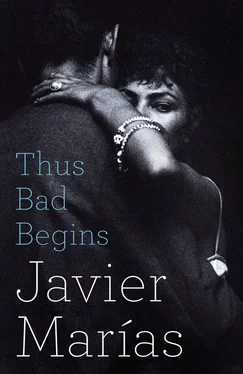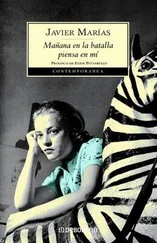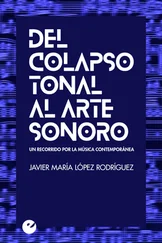‘If you mean Beatriz, forget it. Who could possibly be interested?’
‘Exactly, who could possibly be interested?’
And I replied coolly:
‘No one, as far as I know. Absolutely no one. It’s that curious place that interests me. A strangely neat and tidy place, with a devout, almost fundamentalist air about it; a Germanic air from another age.’
He was still preoccupied by the carnal aspect of the matter and by his friend’s wife, and hadn’t realized that this was a secondary issue for me, part of his private life, about which one should never speak — a rule almost no one obeys. It was as if his amazement at my having seen them together prevented him from making the connection between the supposed calumnies about his remote past to which I had only alluded — I hadn’t actually said anything — and his duties there in the Sanctuary in 1980. Maybe that connection was an indication that he had never entirely changed, I mean that he hadn’t even changed sides, despite his reputation and his friends and despite appearances. At the time, people in Spain lived in permanent fear that a coup d’état might, any day, return us to a dictatorship. Indeed, later on, there were two attempted coups, the second being the most famous.
‘What did you see? And how did you see it?’ asked the bemused sandpaper voice. Even though we weren’t as close to each other as before, he was still speaking in a whisper. He must have assumed that no one could possibly have seen them from outside.
‘I saw everything. Not exactly romantic, I must say.’ I added that last impertinent comment so that he would know I wasn’t bluffing. ‘It was pure chance. I just happened to look in. And there’s a particular corner …’ I wasn’t going to tell him the truth, nor that I had climbed a tree, although if I hadn’t done that, I doubt I would have seen his face. And then I returned to the important, revealing fact: ‘As I understand it, that place, the Sanctuary, is a branch office of Pinochet’s supporters. And you know who their allies are here in Madrid. I’m sure Muriel would like to know about those connections of yours, Doctor. And with good reason. So as to know where he stands.’
Van Vechten turned pale, finally understanding the intent behind my possible indiscretion. First, he came up with an excuse, then he got a grip on himself. First, he felt afraid, then he tried to make me afraid.
‘I’m just doing a favour for an old friend of mine, a priest, and he has absolutely nothing to do with politics. I’m not religious, but neither do I interfere with other people’s beliefs. Nor do I have to answer to a little squirt like you.’ That was when he recovered his sangfroid. He slithered over towards me, his great paw outstretched, doubtless intending to grab me again, though who knows where. However, before he could reach me, I leapt up and removed myself from the semicircle. The waiter shot us another glance. ‘I’m warning you, Juan, be careful what you say. There’s a good and a bad way of telling things and a good and a bad way of listening — and of understanding. So best not say anything, all right?’ And when I said nothing at all, but just stood there looking him up and down as if dumbstruck, he added: ‘Do you understand me, boy?’
I left no money on the table, he was much richer than me. That night’s odyssey was obviously not going to take place, unless he went alone.
‘Still doing people favours, eh, Doctor?’ I said as I was about to make for the bar’s revolving doors. ‘From 1939 until now. How very exhausting.’
When you’re impatient to see someone or to reveal what you’ve discovered, you also tend to put off the moment for as long as possible. Although only, of course, when you’re sure that sooner or later you’ll see the person and be able to tell them your story. If there’s any doubt about this, then haste takes over and things happen in a rush, usually with disappointing results, anticlimax and frustration. I could afford to postpone my encounter with Muriel, to prepare for it and savour it beforehand; to wait until that period of frenetic activity ended and he spent a little more time at home. Besides, during those febrile days, full of brief entrances and continual exits, it wouldn’t have been a good idea to force him to stop, to sit or lie down on the floor and then listen to me for a good long while, entirely against his will. (A prior period of boredom is vital to awakening curiosity and invention.) If, that is, he would agree to hear what I’d found out about Van Vechten, and I thought he would if I insisted and managed to intrigue him. I had to wait for him to calm down, for him to sort out the financing of this new, angrily urgent project or for him to give it up as impossible and resign himself to that for the moment and perhaps until after the summer. The delay suited me, since I was in no particular hurry, but was rather enjoying that pleasurably expectant, alert state of impatience when you feel absolutely certain that your impatience will finally be assuaged.
I had felt uncomfortable about not being upfront with the Doctor when I took him out with me at night in order to observe him and try to get him to open up about his past, and I felt equally ill at ease having to behave like an informer and denounce him and his now proven indecent behaviour to his friend, with all too foreseeable consequences. Many years had passed since his blackmailing activities, if that was true, of course: I had been very slightly persuaded by his explanation that these were slanders put about by his vengeful former franquista comrades, who felt betrayed by his clemency and lack of venom, because everything we are told leaves a faint mark and sows a tiny seed of doubt, which is why it’s not so very odd that sometimes, when we have already composed our own picture of events, we would prefer not to hear any more or to allow the accused to speak, so that he cannot gradually convince us of his innocence and the truth of his story. Yes, many years had passed and people do change and do repent, and they look at their past selves with a feeling of horror, but at the same time are unable to recognize that primitive self, as if they were gazing into a distorting mirror: ‘Was I that person? Did I do that? Was my former self so very bad? If so, there’s no way I can alter it. Guilt is stronger than my desire to make amends, guilt prevents me from even trying, and all I can hope for is that the guilt will pass or grow so old that its remnants will dissolve into the mists in which everything that has ever happened fades and vanishes, until its shape blurs and becomes indistinguishable: the good and the ambiguous, the contradictory and the bad, the crimes and the acts of heroism, the malevolence and the generosity, the honesty and the deceit, the never-ending rancour and the forgiveness finally wrested from the weary victim, the self-sacrifice, the promises made and the cunning acts of exploitation, all, in the end, will be greeted with an oblivious shrug of the shoulders by those who come afterwards and succeed us, preoccupied with their own passions, which are quite enough to cope with, indifferent to everything that happened before they trod the earth, where they will merely be superimposing their footprints on those of their infinite predecessors and peers, not knowing that they’re merely imitating them and that nothing is new under the sun, that everything is doomed to become confused and mingled and homogenized, to be forgotten and left to float on a repetitive magma of which, nevertheless, no one tires, or is it just that none of us has ever found the path that will lead us out?’ (That’s why history is full of Eduardo Muriels and Beatriz Nogueras, of Dr Van Vechtens and Professor Ricos, of Celias and Vidals and Juan de Veres and identical extras, determined, one after the other, to perform the same play and rewrite the same melodramatic plot. There’s nothing original about my character, nor, I suppose, about any of the others.) ‘But until that happens — and however brief a life, it will take a while — there is a terrible, hateful interlude that belongs to us alone, and during which we have no alternative but to cope with what we have done or omitted to do and to distract or placate our feelings of guilt, and sometimes the only way of achieving this is to increase that guilt, to heap up new guilt to cover the old, to overshadow or blur or minimize it, until finally all guilt has passed and there isn’t a soul in the world who can remember what we did, no quick, wicked tongue to talk about it, not even a tremulous finger to point us out as having been the cause of anything.’
Читать дальше












